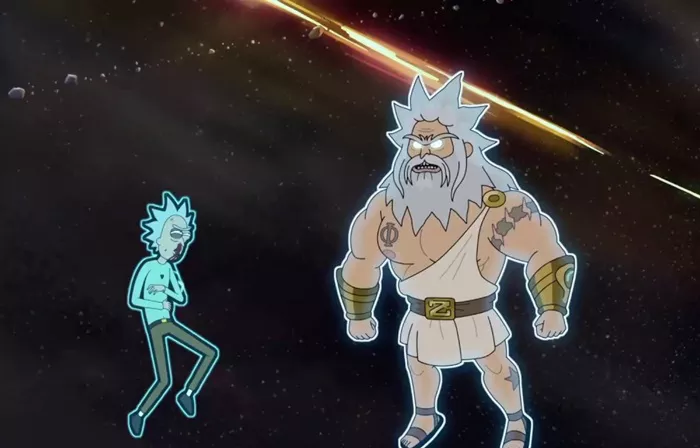Rick Sanchez, the central character in the animated television series “Rick and Morty,” is known for his intelligence, technological prowess, and seemingly limitless abilities. Throughout the series, Rick’s character has been portrayed as extraordinarily capable, often achieving feats that defy conventional logic and science. This article delves into the question of whether Rick can be considered a god within the context of “Rick and Morty,” examining various aspects of his character, his relationships, and the philosophical implications of his actions.
Rick Sanchez
Who is Rick Sanchez?
Rick Sanchez is a brilliant yet deeply flawed scientist who serves as the protagonist (and sometimes antagonist) of “Rick and Morty.” He is portrayed as a cynical and nihilistic individual with a propensity for heavy drinking and a disregard for conventional morality. Despite his flaws, Rick is celebrated for his intellect and his ability to navigate through multiverse adventures with his grandson, Morty Smith.
Characteristics and Abilities
Rick possesses an unparalleled intellect, advanced scientific knowledge, and access to futuristic technology that far surpasses contemporary human capabilities. He has created countless inventions, including interdimensional portals, sentient robots, and devices that manipulate time and space. His abilities often border on the supernatural, prompting questions about the extent of his power.
The Notion of Godhood
Defining “God”
Before delving into whether Rick is considered a god, it is essential to clarify what constitutes godhood within the context of the series. In popular culture and mythology, gods are often depicted as beings with extraordinary powers, immortality, and sometimes control over aspects of the universe or human destiny.
Attributes of Godhood
Gods are typically associated with attributes such as omnipotence (all-powerfulness), omniscience (all-knowingness), omnipresence (being everywhere at once), and immortality (eternal existence). These attributes serve as benchmarks when considering whether a character like Rick can be classified as a god.
Rick’s Abilities and Feats
Omniscience and Intelligence
Rick’s intelligence is a central aspect of his character. He possesses a comprehensive understanding of science, technology, and the workings of the multiverse. His ability to navigate complex situations, anticipate outcomes, and outwit opponents suggests a level of omniscience akin to godlike knowledge.
See Also: WHY DOESN’T RICK MESS WITH TIME?
Omnipotence and Technological Mastery
Rick’s inventions and technological prowess demonstrate a form of omnipotence within the realm of science fiction. He has created devices that defy the laws of physics, alter reality, and manipulate time. His ability to reshape entire worlds and traverse dimensions underscores his unparalleled mastery over the physical universe.
Immortality and Resilience
While Rick is not immortal in the traditional sense, he has demonstrated remarkable resilience and survivability. He has survived numerous life-threatening situations, battles with powerful adversaries, and even his own self-destructive tendencies. His ability to evade death and continue his adventures across the multiverse suggests a form of enduring existence.
Philosophical and Existential Themes
Nihilism and Existentialism
Rick’s character is steeped in nihilism, a philosophical belief that life is inherently meaningless. He often challenges traditional notions of morality, purpose, and existence. His existential outlook on life raises questions about the nature of godhood and the significance of power and knowledge.
Ethical Considerations
Despite his intellect and abilities, Rick’s moral ambiguity and questionable actions complicate the idea of him being a god. He often prioritizes his own desires and interests over the well-being of others, leading to ethical dilemmas and conflicts within the series.
Comparisons to Mythological and Literary Figures
Modern Mythology
In contemporary culture, characters like Rick Sanchez often evoke comparisons to mythological figures or literary archetypes. His role as a brilliant but flawed genius mirrors themes found in myths of trickster gods or mad scientists who challenge established norms and defy divine authority.
Literary Archetypes
Literary figures such as Faust (from Goethe’s “Faust”) or Prometheus (from Greek mythology) share similarities with Rick. These characters possess knowledge and abilities that defy mortal limits but face consequences for their defiance of authority or pursuit of forbidden knowledge.
Interactions with Morty and Other Characters
Dynamic with Morty
Rick’s relationship with Morty, his impressionable grandson, provides insight into his character. While Rick often mentors Morty in dangerous and morally ambiguous adventures, their bond also reveals Rick’s vulnerability and occasional moments of compassion.
Impact on Other Characters
Rick’s interactions with other characters, including family members and fellow beings across the multiverse, showcase his influence and reputation. Some characters revere Rick for his intellect and capabilities, while others fear or resent him for his disregard for consequences.
Limitations and Vulnerabilities
Emotional Vulnerability
Despite his intellect and power, Rick is not immune to emotional vulnerability. He struggles with feelings of loneliness, guilt, and existential despair, which humanize his character and contrast with the notion of him being a god.
Encounters with Equals and Superiors
Throughout the series, Rick encounters beings and entities that rival or surpass his abilities. Whether facing off against cosmic entities, advanced civilizations, or his own inner demons, Rick’s vulnerabilities and limitations are exposed.
Conclusion
In conclusion, while Rick Sanchez possesses attributes and abilities that approach godlike status within the context of “Rick and Morty,” he is not typically considered a god in the traditional sense. His intelligence, technological mastery, and resilience make him a formidable character within the series, capable of feats that defy human understanding. However, Rick’s flaws, moral ambiguity, and emotional vulnerabilities prevent him from embodying the complete attributes of a god.
The complexity of Rick’s character lies in his contradictions: he is simultaneously a genius capable of altering reality and a deeply flawed individual grappling with existential questions. Whether revered, feared, or misunderstood by other characters in the series, Rick Sanchez challenges perceptions of power, morality, and the nature of godhood itself. As “Rick and Morty” continues to explore themes of science fiction, philosophy, and human nature, Rick’s role will continue to provoke discussions and interpretations about his place within the pantheon of fictional characters.

